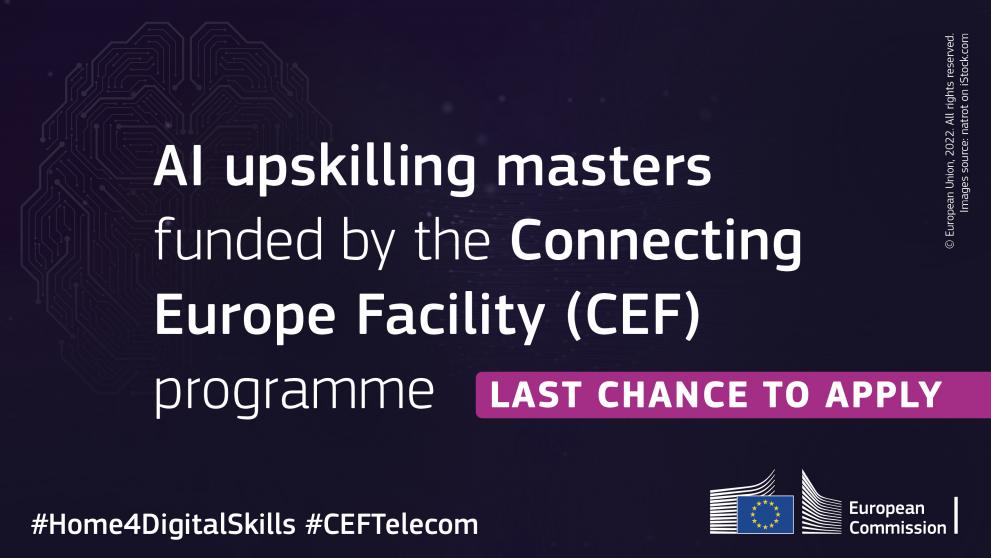
Are you a manager or professional and want to get a better understanding of emerging technologies that are critical for the future of your business or organisation? Are you a tech professional needing to catch up with the latest trends? Last chance to enroll in one of the upskilling masters in AI funded by the Connecting Europe Facility (CEF) programme.
The common objective of the masters is to help the students understand the latest technological developments and apply them creatively in the workplace – both in the public and private sectors. All of them include online and offline modules.
The masters: AI4Gov master in Artificial Intelligence for public services
The AI4Gov master in Artificial Intelligence for public services (2021-2022) is aimed at educating functional specialists in the application of AI to public services.
The first edition was jointly launched last October by the Universidad Politécnica de Madrid (Spain), the Politecnico di Milano (Italy), the Friedrich-Alexander-Universität Erlangen-Nürnberg (Germany) and the Tallinn University of Technology. The programme is part of a wider initiative in which university networks, small and medium-sized enterprises (SMEs) and top researchers have joined forces to:
- foster AI literacy within the public sector in the EU;
- create an AI ecosystem within Europe, including an AI centre of excellence for public services;
- build a participants’ community across the partner universities.
With the first edition with 40 high-level participants just concluded, the selection of candidates for the second edition of AI4Gov (2022-2023) is currently taking place.
The masters: Human Centred Artificial Intelligence Masters (HCAIM)
The Human Centred Artificial Intelligence Masters (HCAIM) is targeting students with a technology background.
It is being prepared by the Technological University of Dublin (Ireland), University Federico II of Naples (Italy), HU University of Applied Sciences of Utrecht (The Netherlands) and Budapest University of Technology and Economics (Hungary), in partnership with research centres and SMEs. It will be launched this September and will last one year.
The master contributes to AI solutions that are ethical, sustainable and trustworthy – meeting even the most recent European guidelines in the matter. The learning method is based on challenges – either technical, ethical, or real-world projects – and combines hackathons, ethicons, panel discussions and lectures by European and international experts from industry, academia and research.
The masters: MAI4CAREU’s master programmes in AI 4 Careers in Europe
The MAI4CAREU’s master programmes are admitting graduate students willing to specialise in AI.
They include:
- a new MSc in AI at the University of Cyprus;
- a new AI specialisation within the master of engineering in computer systems and technologies at the University of Ruse Angel Kanchev (Bulgaria);
- a MSc in AI at the University of Bologna (Italy);
- a modernised MSc in computer science with an AI specialisation at the Technische Universität Dresden (Germany) – this will kick off in the following academic year.
The universities above are joining forces with a research and innovation centre of excellence and four high-tech SMEs to contribute towards the creation of a new generation of AI specialists, equipped with advanced digital skills and deep ethical awareness. A common counselling and mentoring model, supplemented with industry internships, provides students with a unique educational experience that is closer to the actual and future needs of the AI labour market.
Making AI skills broadly available
The online modules of these programmes will be accessible via the Digital Skills and Jobs Core Service Platform in several EU languages. This is part of the European Commission’s objective to improve advanced digital skills in key digital domains like AI.
Details
- Publication date
- 28 July 2022
- Author
- European Health and Digital Executive Agency
- Programme Sector
- Digital
- Programme
- Connecting Europe Facility 1
- Connecting Europe Facility 2
- Tags
- Digital technology
- Digital transformation
- EUFunded
